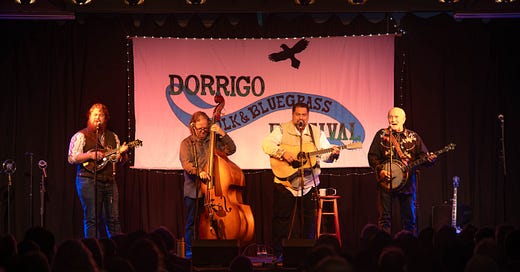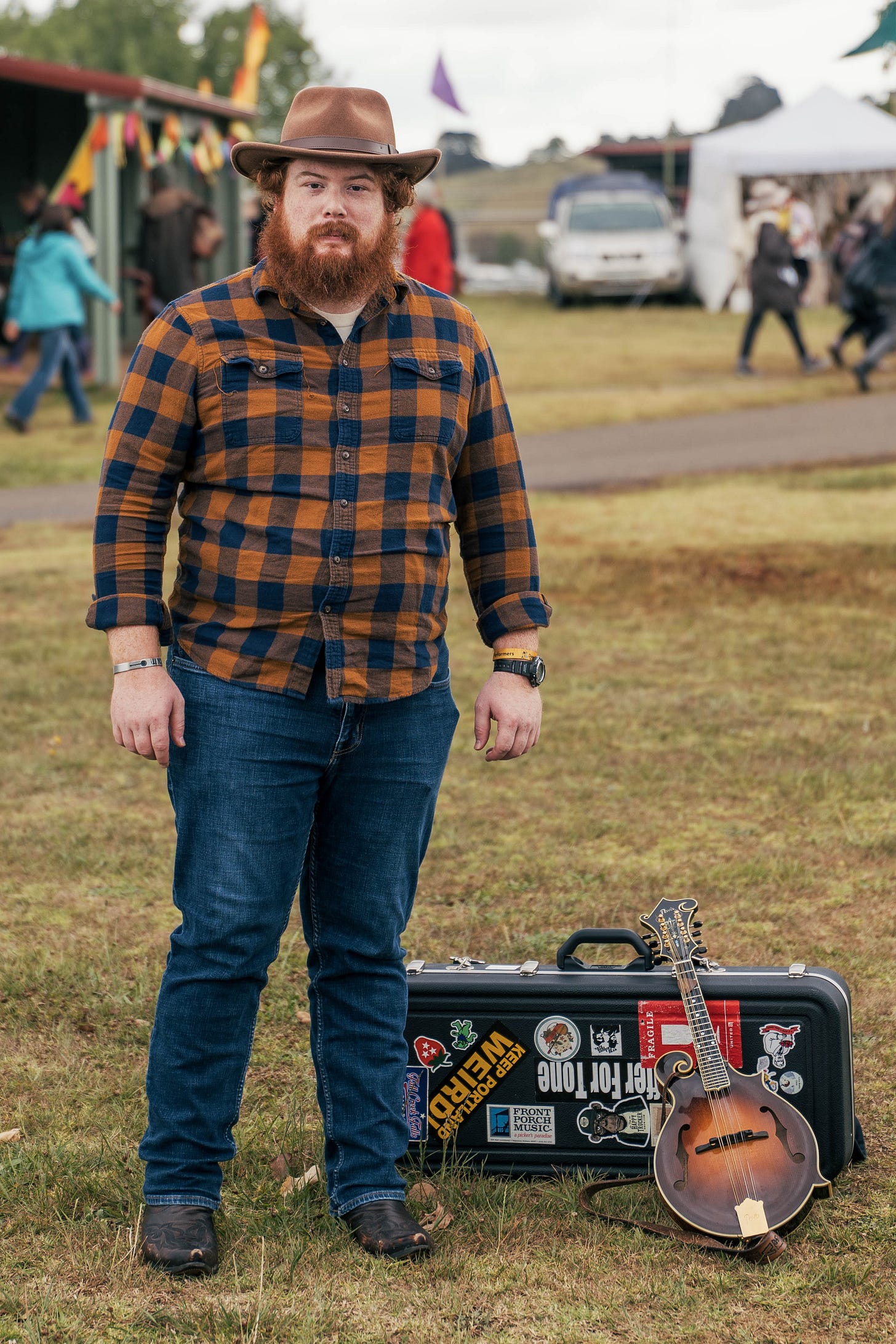Meet The Special Consensus mandolinist, Michael Prewitt
The future of bluegrass, modern country, authenticity, Flatt & Scruggs, Oliver Anthony and Willie Nelson
A few weeks ago I headed to Dorrigo in Northern New South Wales to cover their renowned Dorrigo Folk & Bluegrass Festival. I can’t say that I listen to bluegrass every day, but when I see it live, I absolutely love it. Something about that music and culture has always moved me, and I’m sure where and how I grew up played a part. I have a great memory in my late teens of attending a Ralph Stanley and sons (Clinch Mountain Boys) concert with my Dad at Bill’s Pickin’ Parlor in Columbia, South Carolina, and I went to college in Appalachia where I enjoyed my fair share of bluegrass. My folks hail from and currently reside in the Bluegrass State, Kentucky. I was one of my idols, Dolly Parton, for Halloween last year. I’m at least somewhat qualified to write about this unique, amazing music genre.
One lovely surprise at the festival happened when I attended a workshop led by world famous, Grammy-nominated bluegrass band The Special Consensus. There I learned that one of their band members, Michael Prewitt was actually from Eastern Kentucky. Intrigued, I pulled him aside afterwards, where he kindly agreed to an interview. Then he ended up hanging out with my boyfriend, Josh, our friend Sam and me, where we all drank wine and chatted in the van. Here’s a video of Michael playing some mandolin ditties after the workshop.
Michael grew up on an old tobacco farm in Whitley county, a 45 minute drive east of Somerset. It wasn’t until he left Kentucky for an English degree at grad school in North Dakota that he began to reexamine his bluegrass roots.
”As far as making a conscious choice to seek out Kentucky traditions and integrate them into my personal life and mental health, the first time I ever did that was when I moved away and was homesick,” he says.
(As an ex-pat, I deeply relate to this.)
He’s been a musician his whole life. He started playing fiddle at 6 or 7 and picked up the mandolin at 12. A couple of his teachers sponsored an afterschool bluegrass band called Colonel Strings. They let students check out instruments, and Michael decided to go for the mandolin.
“When I first picked up the mandolin, it just made so much more sense (than the fiddle). I think because of the frets, you could actually see them,” Michael says.
That was when he got started. According to his bio, he went on to play bluegrass with an Eastern Kentucky group called Mountain Drive but then took a hiatus as he went to college. He only recently started playing music full time. In North Dakota he briefly taught English as an adjunct at the University of North Dakota while also getting into “the small but healthy bluegrass scene” in the region. During the pandemic he lost his teaching job and was working as a mail clerk in Minneapolis when he got the call to join The Special Consensus.
Michael had previously worked with a Special Consensus band member named Chris Jones. Chris played in the band in the 80s. He was an old friend and Michael would fill in for him on mandolin occasionally.
The Special Consensus has been going since 1975. It kicked off in Chicago on Lincoln Avenue, where, at the time, everything was happening. Gradually the band morphed from Chicago-based to international. Michael jokes he’s probably the 50th band member, and they have welcomed many fantastic musicians over the years.
“When the mandolin job became available, Chris had mentioned my name to (co-founding member, banjoist) Greg Cahill. So then I just got this call one day and worked out the details. It was good,” Michael says. “I was sort of at the end of my rope, like, ‘I've got to do something different. I want to play music. I don't want to be a mail clerk.’ So that happened. And it's been great.”
The band never stops touring, with approximately 100 tour dates a year. Michael has now been playing with them for three years, and when he’s not doing that, he teaches and plays music in and around his current home of Portland, Tennessee, located in the outskirts of Nashville. In October, Michael released a new single called “Nine Miles out of Louisville.”
He thinks bluegrass music is heading in a good direction.
”The word ‘bluegrass’ has a lot of energy attached to it, a lot of meanings, especially depending on where you are. But more and more things are falling under the umbrella of bluegrass. In the beginning it meant a very, very specific thing. And now you'll see a cello in a band that calls itself a bluegrass band, or you'll see a band that has drums or keys. If you say ‘we're going to a bluegrass festival’ in people's minds it means chill, but fun, camping, not very hierarchical and very open, a community-focused thing,” he says.
He mentioned musicians like Billy Strings, and Molly Tuttle who are turning into rock stars, and how people who wouldn’t necessarily come to a bluegrass festival are now packing out arenas to see bluegrass artists. He thinks that streaming is really good for bluegrass.
”There's lots of musicians who have very different opinions on streaming. I'm all for it. Because I think the music has gotten better in the last 10 to 15 years because not only do you have access to what's commercially available right now, but also you have access to a 1957 concert from Flatt and Scruggs that anyone, from their home, can bring up and just learn from it and be inspired by it. The democratization of the internet, it's only good for it.”
I asked him about controversial country artist Oliver Anthony, who recently exploded in popularity but also highly divided the public. Michael joked he thinks he’s great for guys with red hair and thick beards.
Sharing a US perspective on Oliver’s runaway hit, “Rich Men North of Richmond”, Michael kindly responded to my loaded question.
He thinks the song’s popularity right now is telling.
”I don't like how, as a culture, we are responding to art based on how our self-defined side responds to it. You have to either like or not like something based on the political valence that's contained in this piece of art. The reason I don't like his music is not necessarily because it's really offensive to me. It's just there's really nothing at the heart of it except for politics. There's some types of that music that I do like, but it all depends on what your politics are. I think the politics of that song are really unclear for one; It's just sort of vague resentment,” he says.
He mentioned modern folk artists like Tyler Childers, Chris Stapleton and Sturgill Simpson. Michael wonders if Oliver Anthony might be a natural byproduct of that music.
”He's nowhere near their level of artistry, but what is being seen as authentic now, especially in masculine, coded music. And people were like, ‘he's from the Blue Ridge Mountains. He worked in a factory, he sings about working people,” Michael says.
He said aesthetically, Oliver’s vocals are really hollering, and everybody is doing it at the moment, especially guys in their 20s or early 30s who want to be seen as legitimate.
“They have to put on a work jacket and work boots and scream about drugs, alcohol or being poor into the microphone. There's room for all of that, if it's done well,” Michael says.
Michael’s style of singing is heavily influenced by Willie Nelson, one of his favorite singers. He said many people think of the soft, nasally vocals Willie sings with as “not working class,” when it actually is.
He and I agreed so much of modern music comes down to the fascinating quest for authenticity. In the workshop I attended, a question came up about Australians’ singing bluegrass and country music in a North American accent, which does often happen. (Rappers will do it too.)
”When I hear an Australian band sing bluegrass, I want to hear Australian accents. I want to hear upper New York State accents when I hear them sing, and bands that do that, it's really cool. At the same time, I'm from Eastern Kentucky and I'm gonna sing with the Eastern Kentucky accent,” Michael says. “There's all sorts of ways of being authentic. And if you're trying to hue to any sort of standard, I think that gets rid of authenticity in the process. Of course, you don't want to try to be unique either; you just want to be who you are."
I was so excited to hang out with Michael later that afternoon and continue our chat about accents, music, culture, and the venomous spiders and snakes in Australia. Check out his new song, and I’ll wrap things up with a quick video I got from the band singing acapella on the first night of the festival.
Thanks to Dorrigo Bluegrass Festival for having me, and thanks to Michael and The Special Consensus for your shows all weekend; I was able to make every single one.
If you liked my story on Michael and are interested in more reflections on music, people and culture, why not subscribe to read me every Monday? I can’t promise I’ll write about bluegrass constantly, but this won’t be the last time either!




